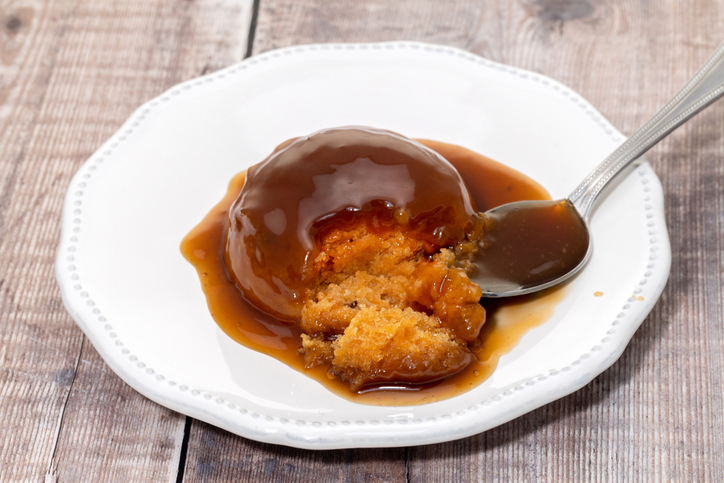There are certain names of puddings that, if whispered to an Englishman of a certain age, will bring back near-Proustian reveries about their childhood. Rhubarb crumble. Bakewell tart. Sticky toffee pudding. The most naughty-sounding of them all, spotted dick.
These, and many more, are often dismissed with the sobriquet ‘nursery food’, but in fact only the most well-heeled of dessert-munchers would ever have enjoyed such fare in their nursery. In fact, they were mostly likely to have been encountered at various fee-paying institutions, firstly as a staple of the boarding school lunch or supper. They then would have kept popping up in different guises throughout life, whether served at Oxbridge high table, at an Inns of Court lunch or simply on demand in a members’ club on St James.
Not, of course, that mum (or dad) has the opportunity to spend hours making such a crumble
They might well be regarded as an innocent – if undeniably calorific and stodge-laden – pleasure, but it is now being suggested that there has been a lack of uptake for the great British pudding in domestic circles too. Dr Andrew Hann, an English Heritage expert, has reported without relish that:
People tend to ‘like what they know’ and, over time, this has led to puddings falling out of fashion with younger generations who rarely eat them. If this decline continues, we can expect the classic great British pud to all but vanish within the next 50 years.
Hann, rightly, sees this as a disaster, remarking that:
I’m pretty sure I speak for most people when I say that is not something we want to happen. There truly is nothing better in life than syrup sponge smothered in custard.
Yet he might, alas, be fighting a losing battle. As he notes, the tendency for families to have meals together is declining. Younger members are often far more interested in WhatsApping artfully lit naked pictures of themselves to potential paramours or fighting strangers on X than enjoying the delights of mater’s apple crumble.
Not, of course, that mum (or dad) has the opportunity to spend hours making such a crumble. Chances are these days in the average nuclear family that both parents have full-time jobs that involve a complex maelstrom of childcare arrangements in order to keep body and soul together. The last thing that any parent generally wants to do at the end of a busy working day is to come home and make an elaborate dessert that will include lashings of custard and, no doubt, something deliciously unhealthy involving suet, raisins, sugar and all sorts of other forbidden delights.
We live in a censorious and increasingly boring age, and the knowledge that the great British pudding is one of the many trifles (no pun intended) that is threatened by the demands of work and waistline management alike is a minor tragedy. Three cheers to English Heritage, who have a range of schemes designed to get us eating pudding all over again – ranging from publishing a book that includes a range of classic recipes to creating ice creams to be sold at their properties in what remains of the summer. There will be both sticky toffee and apple crumble flavours – but I fear that it might be too little, too late.
Still, for myself, you’ll have to prise my final helping of spotted dick from my cold, dead hands before I give it up for good. And even if it has led to an almighty coronary in the process, at least I will have gone down with a pudding-induced smile on my face.







Comments